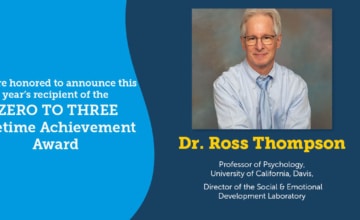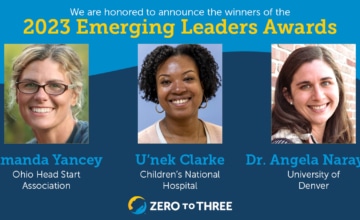New Commission Releases Call for Applications from Early Childhood Educators
At a time when early childhood educators confront a deepening crisis despite proving how critical they are to children, families, and the American economy, 17 national organizations dedicated to young children have come together to form a new Commission on Professional Excellence in Early Childhood Education.

Apply to serve on the Commission on Professional Excellence in Early Childhood Education today!
The Commission’s mission, as originally outlined in the Unifying Framework for the Early Childhood Education Professionoffsite link, is to develop and promote the framework for a unified, cohesive, and equitable early childhood education profession informed by and in partnership with early childhood educators across states and settings.
“The pandemic has laid bare our challenges, especially the economic disparities and deficiencies in early childhood education,“ said Margaret Michaels DeCan, CEO and Executive Director of Children’s Development Academy in Roswell, Georgia. “Early childhood education in America is an unfair, inequitable system built on our backs. It is past time for us to be recognized, valued, and paid in keeping with our skills, experience, and importance.”
Today, upon launch and in ongoing recognition of the importance of educators’ voices, the Commission is opening an application (English Applicationoffsite link) (Spanish Applicationoffsite link) process for individual early childhood educators to apply to be co-equal, full voting members of the Commission. Applications are open until Friday, May 27th, and all associated expenses for early childhood educators to participate will be covered by the Commission’s organizational members. The Commission will appoint up to seven early childhood educators, representing a diverse cross-section of the profession.
This landmark Commission is guided, first and foremost, by more than 20 years of neuroscience research and economic evidence showing that a child’s early years are the most critical time of development in the human brain; that early childhood educators play an essential yet undervalued role in their cognitive, social, emotional, physical, and language development; and that high-quality early childhood education leads to substantial returns on public investments. Housed as a semi-autonomous body within the National Association for the Education of Young Children (NAEYC), the Commission also is guided by the Institute of Medicine and National Research Council report, Transforming the Workforce for Children Birth Through Age 8, the Power to the Profession Task Force’s Unifying Framework for the Early Childhood Education Profession, and The Professional Standards and Competencies for Early Childhood Educators.
The Power to the Profession Task Force recommended establishing the Commission, identified as the Professional Governance Body in the Unifying Framework, with a vision that the profession develops a cohesive and transparent system of support, infrastructure, and accountability that leads to a high-quality, equitable, and effective early childhood education workforce. A transition committee led the development and launch of the Commission following the Task Force’s conclusion.
In our current, complex system, funding levels, professional pathways, and competency requirements differ by state, age of children, type of program, and setting. This lack of systemic clarity and underinvestment results in astonishing inequities and overcomplications for early childhood educators seeking to advance their knowledge, skills, and competencies; to remain in the early childhood education profession; and to receive professional salaries, health insurance, and retirement benefits. Early childhood educators are the backbone of high-quality early childhood education programs, and yet they still only earn on average less than $12.50 per hour. Nearly half earn such low wages that they live in families accessing public benefits to make ends meet, and only 15 percent have employer-sponsored health insurance.
“With support from educators and partners, our organizations are working together toward compensation parity, unified competencies, reciprocity, and practice autonomy for early childhood educators to ensure that these elements of a strong system are aligned across states, systems, and programs,” said Commission Chair Dr. Shyrelle Eubanks, Senior Policy Analyst at the Education Policy Implementation Center for the National Education Association. “We invite early childhood educators to continue on this journey and apply to serve on the Commission.”
Commission members include:
- Association for Supervision and Curriculum Development (ASCD)
- American Federation of Teachers, AFL-CIO (AFT)
- Associate Degree Early Childhood Teacher Educators (AACTE)
- Child Care Aware of America (CCAoA)
- Child Care Services Association, T.E.A.C.H. Early Childhood National Center
- Council for Professional Recognition
- Division for Early Childhood of the Council for Exceptional Children
- Early Care and Education Consortium (ECEC)
- McCormick Center for Early Childhood Leadership
- National Association for Family Child Care (NAFCC)
- National Association for the Education of Young Children (NAEYC)
- National Association of Early Childhood Teacher Educators (NAECTE)
- National Black Child Development Institute (NBCDI)
- National Education Association (NEA)
- National Indian Child Care Association (NICCA)
- National Workforce Registry Alliance (NWRA)
- ZERO TO THREE (ZTT)


